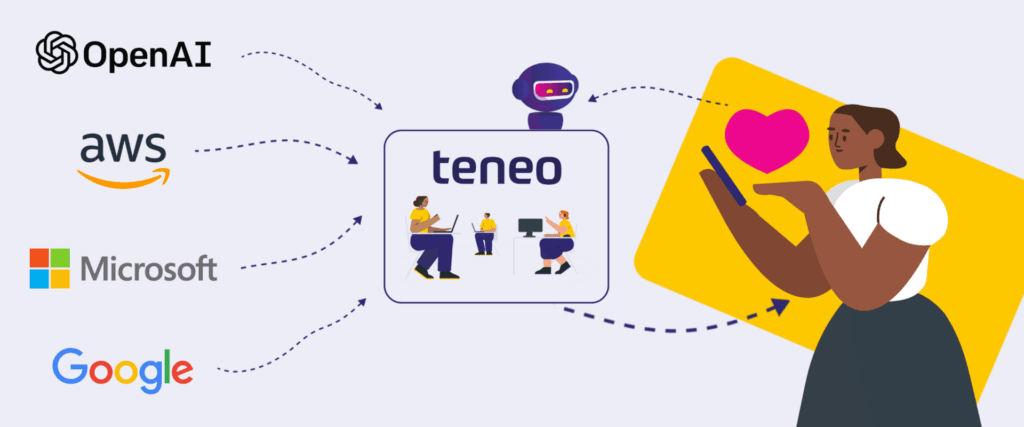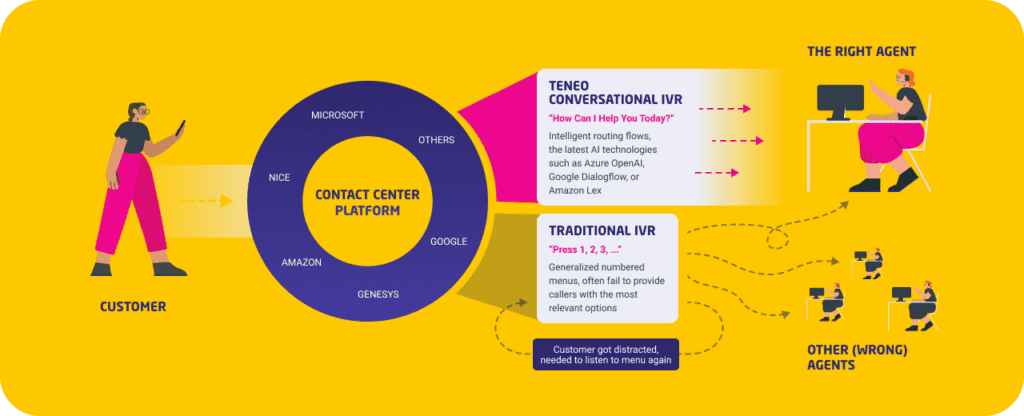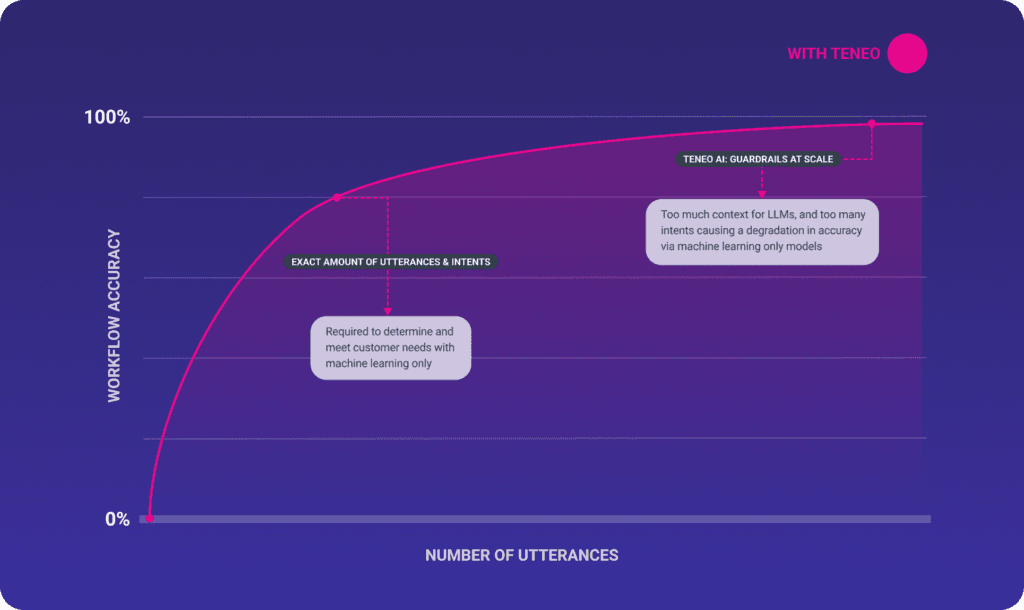When it comes to comparing conversational AI platforms, it’s important to consider factors such as ease-of-use, efficiency, and the results you can expect from each platform. Here’s how Teneo compares to other popular chatbot platforms

Comparing Conversational AI Platforms
Choosing the right conversational AI platform can significantly impact customer experience. This post explores how Teneo compares with other platforms like Google Dialogflow, Amazon Lex, Sprinklr, IBM Watson, and Genesys Cloud, focusing on Ease of Use, Natural Language Understanding (NLU) Capabilities, Customization, and Scalability. Here’s why Teneo stands out:
Teneo
Teneo is a Conversational AI Platform that was created by the company Teneo.ai.

- Ease of Use: Teneo offers an intuitive drag-and-drop interface alongside powerful scripting, catering to both developers and non-technical users. Its streamlined design simplifies managing complex interactions. For example, Swisscom saw a 30% reduction in deployment time, while Telefónica achieved a significant reduction in training time for staff using Teneo.
- NLU Capabilities: Teneo excels in understanding complex user intents in over +100 languages, and maintains context over long interactions, ideal for sophisticated flows. Teneo delivers +95 accuracy in intent recognition, outperforming all its competitors, and contributing to a 20% increase in user satisfaction for Telefónica.
- Customization and Flexibility: Teneo provides deep customization through scripting, allowing businesses to create highly tailored interactions without extensive coding. This customization supports diverse use cases and enables seamless integration with existing systems.
- Scalability: Teneo’s cloud-agnostic architecture enables easy scaling, fitting businesses of all sizes. For example, Swisscom handled over 10 million customer interactions annually, while a large tech company leveraging Teneo achieved a $39 million ROI, demonstrating the platform’s scalability and cost-effectiveness.
You can find more customer examples on conversational IVR case studies.
Google Dialogflow
Google DialogFlow is a Conversational AI platform built by Google.
- Ease of Use: Dialogflow has a user-friendly setup for basic bots but struggles with complex workflows. Managing context across multiple intents can be challenging.
- NLU Capabilities: Dialogflow handles basic intents well but often loses context in longer and more complex conversations.
- Customization and Flexibility: Dialogflow offers basic customization but becomes cumbersome for advanced needs.
- Scalability: Dialogflow can scale but often requires additional costly Google Cloud services for high traffic.
Teneo vs. Google Dialogflow
- Teneo outshines Dialogflow with its superior ability to maintain context throughout complex conversations, offering a smoother and more natural user experience. Its advanced scripting capabilities make it easy to implement intricate logic, making Teneo a better fit for projects that require more than basic customization. Additionally, Teneo’s architecture simplifies scaling for high-traffic environments, eliminating the need for extra services that Dialogflow often relies on. For projects were maintaining conversational flow and handling complex requirements are crucial, Teneo clearly takes the lead while it is a Google Partner.
- For organizations already using Dialogflow, Teneo offers the Teneo Accuracy Booster, which can be integrated on top of Dialogflow to significantly enhance its accuracy. This booster leverages Teneo’s advanced understanding capabilities to refine intent recognition, improve contextual consistency, and reduce misinterpretations in user inputs, making it ideal for complex or high-stakes deployments where accuracy is paramount.
Amazon Lex
Amazon Lex is a Conversational AI Platform built by Amazon.

- Ease of Use: Amazon Lex is easy to set up for those familiar with AWS but can be daunting for newcomers.
- NLU Capabilities: Amazon Lex is strong in voice recognition but less versatile with text-based interactions.
- Customization and Flexibility: Amazon Lex’s customization is tied to AWS, making it less flexible outside that ecosystem.
- Scalability: Lex scales well on AWS but requires expertise in AWS architecture.
Teneo vs. Amazon Lex
Teneo surpasses Amazon Lex by offering a more intuitive interface, ensuring a smoother learning curve, especially for users unfamiliar with AWS. Unlike Amazon Lex, which is closely tied to the AWS ecosystem, Teneo provides greater flexibility, allowing businesses to build solutions without vendor lock-in. Additionally, Teneo’s deployment capabilities make scaling straightforward, removing the need for deep expertise in specific cloud architectures—a common hurdle with Amazon Lex.

For those using Amazon Lex, Teneo Accuracy Booster can be layered on top to significantly improve intent recognition and accuracy, enhancing the overall conversational experience without the limitations of Amazon Lex’s default capabilities.
Sprinklr
Sprinklr is an software company that develops a customer experience management (CXM) platform. In this platform you are able to build bots, which will be reviewed below:
- Ease of Use: Sprinklr integrates well into its broader ecosystem but can be complex for new users.
- NLU Capabilities: Sprinklr’s NLU focuses on customer service needs but lacks the depth for complex queries.
- Customization and Flexibility: Sprinklr’s customization fits well with its customer engagement suite, but it lacks the adaptability of more specialized platforms.
- Scalability: Sprinklr handles large volumes in social channels but is limited in other areas.
Teneo vs. Sprinklr
Teneo stands out against Sprinklr by offering a faster and more focused setup for conversational AI, making it easier for teams to get started without navigating a broader ecosystem. While Sprinklr’s Natural Language Understanding (NLU) capabilities are tuned for customer service, Teneo’s models excel in handling complex queries with an accuracy rate exceeding 95% and capturing nuanced language. Teneo also provides unmatched flexibility for creating unique conversational experiences beyond the constraints of a predefined engagement suite. Its ability to scale effortlessly across various platforms and channels ensures a consistent and high-quality user experience, even outside social channels, where Sprinklr is more limited.

Moreover, Teneo can be seamlessly integrated with Sprinklr to act as the Conversational IVR agent users interact with. This leads to significantly boosting accuracy for customer interactions. Teneo can enhance the IVR experience, providing intelligent and responsive conversational flows that outperform traditional systems in accuracy and user satisfaction.
IBM Watson

- Ease of Use: Watson’s interface is detailed but can be overwhelming for beginners.
- NLU Capabilities: Watson offers strong NLU but requires more time for training.
- Customization and Flexibility: Watson’s customization is powerful but time-consuming.
- Scalability: Watson is enterprise-ready but resource-intensive.
Teneo vs. IBM Watson

Teneo outshines IBM Watson with its intuitive design. Making it easier for teams to get started without the steep learning curve. In addition, Teneo also simplifies complex customization, providing a faster and more manageable approach compared to Watson’s time-intensive setup. Furthermore, Teneo’s leaner architecture ensures smoother scalability. Allowing businesses to expand without the heavy infrastructure demands that can come with Watson.
Genesys Cloud
Genesys Cloud is an software company that sells customer experience (CX) solutions and call center technology. This platform also allows you to create your own bots.
- Ease of Use: Genesys is designed for contact centers, making it effective in that niche but less flexible for applications.
- NLU Capabilities: Genesys NLU is reliable for common queries but lacks depth for diverse language needs and multi-turn interactions.
- Customization and Flexibility: Genesys customization is optimized for call center needs, but it lacks the adaptability to broader use cases.
- Scalability: Genesys scales effectively in contact centers but is limited in versatility for other environments.
Teneo vs. Genesys Cloud

Teneo surpasses Genesys Cloud with its adaptability across a wider range of applications. From customer service to custom AI solutions beyond contact centers. Genesys handles common DTMF requests well. Teneo’s advanced NLU offers greater depth, managing diverse language needs and complex, multi-turn interactions with ease. Teneo provides more comprehensive customization options, making it suitable for varied business requirements beyond the call center focus of Genesys. Additionally, Teneo’s scalability extends seamlessly across different industries and use cases. Offering greater flexibility compared to the contact-center-centric design of Genesys.

Moreover, Teneo has a native integration with Genesys that allows businesses to use Teneo agents when customers dial in, enhancing the call experience with intelligent, conversational interactions. This integration enables Teneo to act as the IVR agent, handling complex queries with precision and improving overall engagement accuracy, setting it apart from traditional systems.
Final Thoughts
While each platform has its strengths, Teneo consistently offers a better balance of user-friendliness, advanced capabilities, and flexibility. Its ability to handle complex scenarios, combined with quick deployment and scalability. Makes it the ideal choice for businesses looking to deliver exceptional conversational AI experiences. Teneo’s focus on providing tailored solutions ensures that businesses can exceed user expectations in every interaction. This leads to Call Center automation, Contact Center automation and Agentless Contact Center
The Power of AI Chatbots
To learn more about the unique features and capabilities of Teneo Chatbots, visit our detailed guide.

